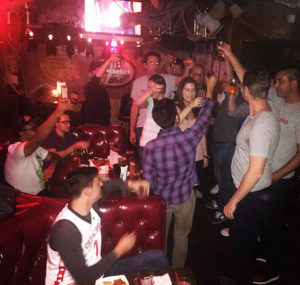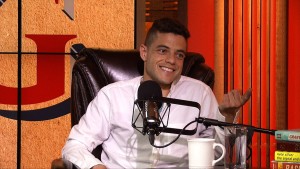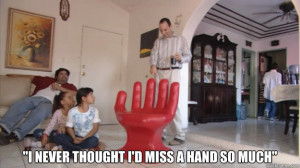 This past Friday, news came out that ESPN would be shutting down the sports and pop culture website Grantland.com, effectively immediately. The site, with its “free flowing” content that “occasionally touche[d] on mature subjects,” was known for its overly long columns. In hind sight, they weren’t nearly long enough.
This past Friday, news came out that ESPN would be shutting down the sports and pop culture website Grantland.com, effectively immediately. The site, with its “free flowing” content that “occasionally touche[d] on mature subjects,” was known for its overly long columns. In hind sight, they weren’t nearly long enough.
Though this announcement seemed sudden, especially considering its finality, this news now doesn’t seem all that surprising. The website was, after all, the brainchild of media giant Bill Simmons, a prominent former ESPN personality who ended up having such a troubled relationship with certain ESPN suits that, despite his popularity, he was effectively fired earlier this spring. Given the site’s close ties to Simmons, and the conflict that seemed to exist because of that connection, it wasn’t hard to imagine things going south.
Rumors eventually emerged of behind-the-scenes tension between new management and the writing staff, every one of which was personally hand-picked and hired by the man Jalen Rose and David Jacoby called The Podfather. Then it was reported that several writers, such as Wesley Morris, were leaving the fold for now-greener pastures. Mere weeks later, four of Grantland’s editors – Sean Fennessey, Juliet Litman, Mallory Rubin, and Chris Ryan – synchronously and unexpectedly quit to go work with Simmons on his new project at HBO. Grantland’s NFL Podcast, which typically released three episodes every week, went silent for 14 straight days, allegedly because ESPN brass didn’t approve of hosts Barnwell and Mays paying on-air tribute to their departed-yet-beloved brethren.
Despite these dark omens, I was in complete denial my favorite media outlet would ever cease to exist. Alas.
 To be fair, I’ve been a voracious consumer of all things Simmons for a good six years now. When bored during college breaks my senior year, I would spend hours digging through his old Page 2 articles about the Levels of Losing or the worst types of fans at a baseball game (the guy who dips and spits on the ground instead of a receptacle being my favorite – so grimy). Listening to archived B.S. Reports got me through an unpaid internship consisting of mostly eye-bleeding data scrubbing. I stood in line for over an hour when he came to DC on a book signing tour for The Book of Basketball. When Bullets and I were living together one fall, we would listen to and guess the NFL gambling lines along with Bill and Cousin Sal on their podcast, keeping score to see how we stacked up. And I still remember when he announced he would be starting his own offshoot of ESPN, a domain which had yet to be named but would become Grantland.com.
To be fair, I’ve been a voracious consumer of all things Simmons for a good six years now. When bored during college breaks my senior year, I would spend hours digging through his old Page 2 articles about the Levels of Losing or the worst types of fans at a baseball game (the guy who dips and spits on the ground instead of a receptacle being my favorite – so grimy). Listening to archived B.S. Reports got me through an unpaid internship consisting of mostly eye-bleeding data scrubbing. I stood in line for over an hour when he came to DC on a book signing tour for The Book of Basketball. When Bullets and I were living together one fall, we would listen to and guess the NFL gambling lines along with Bill and Cousin Sal on their podcast, keeping score to see how we stacked up. And I still remember when he announced he would be starting his own offshoot of ESPN, a domain which had yet to be named but would become Grantland.com.
Grantland in its early days was different than what it would ultimately turn into. Simmons initially wrote multiple columns a week. They tried to recruit name-brand, established, senior writers like Chuck Klosterman, Dave Eggers and Malcolm Gladwell to contribute consistently. Sebastian Pruti, not Zach Lowe, was their head basketball writer – something which is hard to believe considering the hugely-influential and well-connected hoops titan Lowe has since become. But even at the beginning, the website was something special. Even in light of all the amazing things Simmons has done in his career – from establishing sports tropes like The Ewing Theory to spawning the 30 for 30 documentary series – Grantland is, in my opinion, his crowning achievement to date.
Hell, Grantland was probably the biggest reason we founded this website in the first place. We didn’t realize it at first, but in creating Bobcat Territory’s mission statement and overall aesthetic, we legitimately had conversations about how we could make sure we weren’t accidentally copying Grantland exactly, because what we had in mind was so closely in line with what that site was already doing.
When I heard the sad news on Friday that Grantland was being taken down, I knew I needed to write something, but I felt a bit weird about doing so. In a way, I personally have nothing to do with Grantland, especially in comparison to the writers whose jobs were eliminated. It’s not as if I wrote for the site.
 Instead, I merely follow a lot of those writers on Twitter, and my feed that Friday read like a eulogy, with so many words of praise and remembrance and nostalgia being shared. Robert Mays even tweeted the surreal story, in bites each less than 160 characters, of how a chance encounter with Bill Simmons at a Celtics game landed him a job that lead to the greatest 5 years of his life. A picture was posted of a farewell happy hour with many of the writers toasting to the good times, which made me feel very aware that, despite me feeling like I know so many of the site’s contributors, they have no idea who I or any of my friends are.
Instead, I merely follow a lot of those writers on Twitter, and my feed that Friday read like a eulogy, with so many words of praise and remembrance and nostalgia being shared. Robert Mays even tweeted the surreal story, in bites each less than 160 characters, of how a chance encounter with Bill Simmons at a Celtics game landed him a job that lead to the greatest 5 years of his life. A picture was posted of a farewell happy hour with many of the writers toasting to the good times, which made me feel very aware that, despite me feeling like I know so many of the site’s contributors, they have no idea who I or any of my friends are.
Yet that, I think, is sort of the point. It’s what I wanted to ultimately write about. It’s what I adored about Grantland, and made me love it so much.
Sure, the consistent quality of Grantland’s writing and analysis was unparalleled. Grantland’s NBA Shootaround saw columnists like Andrew Sharp and Jason Concepcion write about basketball with such excitement and delight that it made you like the sport more simply by reading them. While other pop culture sites review TV episodes with bulleted wikipedia-esque plot summaries, Andy Greenwald would provide close readings that turned television into an art form. Chuck Klosterman could get you to think about TV’s Mount Rushmore – Breaking Bad, Mad Men, The Sopranos, and The Wire – in a way you never would have considered.
That stuff was just part of the normal routine for Grantland, too, but they could go beyond that as well. In fact, the website is responsible for two of the three (the other being David Foster Wallace’s Federer as Religious Experience) most incredible and unforgettable pieces of journalism I’ve ever experienced, despite them each being incredibly long and about subjects I normally don’t care about: Out in the Great Alone, about the Iditarod dog sled race, and The Sea of Crises, about sumo wrestling and its existence in Japanese culture (both by Brian Phillips).
 While it’ll be a long time before I forget about those pieces, it will undoubtedly be the day-to-day of Grantland I remember most, because it so affected my own day to day. Zach Lowe’s NBA column was an integral and eagerly-anticipated component of my lunch break every Tuesday. Andy Greenwald’s writing was what motivated me to start watching both Game of Thrones and Mr. Robot, not only because he would attest to their quality and I trust his opinion, but also because I didn’t want to, afraid of spoilers, miss out on reading any of his writing. When I watch football with my friend Sagar and a team runs a halfback draw for a meaningless 8 yards to end the half, he and I will turn to each other, smirk, and laugh about how such an unlikely-to-succeed-yet-injury-prone play-call drives Barnwell crazy.
While it’ll be a long time before I forget about those pieces, it will undoubtedly be the day-to-day of Grantland I remember most, because it so affected my own day to day. Zach Lowe’s NBA column was an integral and eagerly-anticipated component of my lunch break every Tuesday. Andy Greenwald’s writing was what motivated me to start watching both Game of Thrones and Mr. Robot, not only because he would attest to their quality and I trust his opinion, but also because I didn’t want to, afraid of spoilers, miss out on reading any of his writing. When I watch football with my friend Sagar and a team runs a halfback draw for a meaningless 8 yards to end the half, he and I will turn to each other, smirk, and laugh about how such an unlikely-to-succeed-yet-injury-prone play-call drives Barnwell crazy.
Grantland infiltrated the lives of its aficionados because the whole website was like a family. I trace this back to Simmons’ bringing his college friends House and Jack-O onto his podcast – despite neither being a professional analyst – a familial behavior which carried over to the rest of the team. Andy Greenwald and Chris Ryan were best friends in college, long before they worked at Grantland. Simmons would refer to Barnwell as his illegitimate son. Rembert Brown would come onto the NFL podcast, allegedly to talk about football, but seemingly more because he just wanted to hang out and have a good time with his friends.
Shout out to @andrewsharp who is my brother, for #hotsportstakes and for saying fuck the Hawks with clear eyes and a full heart
— Chris Ryan (@ChrisRyan77) November 1, 2015
More than the columns, features, podcasts, and videos…I will cherish the people and the memories. Welp, we had a hell of a run.
— Jacoby (@djacoby) October 30, 2015
Honestly, I feel bad not giving shoutouts to all the other writers, too. I’m interested in the NFL, the NBA, and TV, so I read Barnwell, Lowe and Greenwald more than anyone else. But there were so many other contributors I thoroughly enjoyed that I’m sure had the same effect on readers within their own categories. At least half of the 7 hours each week I spend commuting was spent with Grantland personalities. That’s how much the site influenced me. I’m not the only one, either. One of my hometown friends made the claim: “it’s a real possibility that, if you include podcasts, I’ve spent more time consuming content from Grantland than all other outlets combined for the past few years.” He and I happily gave them that mindshare because of this sense of family. Not only one that the actual staff were apart of, but one that, if you were invested as a reader/listener, you became part of too. That’s how you get people feeling like this:
Grantland was incredible & ESPN is ridiculous. I’m a person who never reads anything about sports & I read that site all the time. — emily nussboo (@emilynussbaum) October 30, 2015
!!!!!! https://t.co/H1gwzRUG6J
— Zach Lowe (@ZachLowe_NBA) November 1, 2015
I cannot overstate how difficult that is to pull off. Grantland is a part of Disney, a corporation employing roughly 180,000 people that generates almost $50B in revenue every year. The fact that just Grantland still gave me, one of its millions of readers, true feelings of inclusion and intimacy is downright incredible. It makes observations like this even more discouraging:
Grantland got shut down today. https://t.co/brCyO3wZ8u — Ken Tremendous (@KenTremendous) October 30, 2015
 This sense of family makes me think of another family – The Bluths. Arrested Development, my favorite comedy ever, is hilarious at first glance, but gets increasingly better with every single watch. That’s not only because of the self-referential jokes you don’t notice until the second time through, but also because you learn to recognize and appreciate every character’s idiosyncrasies. Michael’s oblivious. Lindsay’s self-involved. Tobias is both oblivious and self-involved – and super gay. So when they all exhibit behavior they’re known to exhibit, you appreciate it that much more.
This sense of family makes me think of another family – The Bluths. Arrested Development, my favorite comedy ever, is hilarious at first glance, but gets increasingly better with every single watch. That’s not only because of the self-referential jokes you don’t notice until the second time through, but also because you learn to recognize and appreciate every character’s idiosyncrasies. Michael’s oblivious. Lindsay’s self-involved. Tobias is both oblivious and self-involved – and super gay. So when they all exhibit behavior they’re known to exhibit, you appreciate it that much more.
Grantland is much the same. When Jacoby asks Jalen a question about something the former college and NBA star isn’t comfortable divulging, you know he’s going to respond with “Not gon’ be able to do it!” Cousin Sal will impersonate Simmons, referencing Hustle, Bustle, Man-Muscle Russell Wilson, on every Monday podcast. Robert Mays will describe NFL players as fire-breathing dragons and other mythical beasts no matter how many times Barnwell laughs at him for doing so.
But the other reason the comparison between Grantland and Arrested seems fitting is that both were cancelled before their time. Each, despite widespread critical praise and a deep cult following, were done away with prematurely, while still operating at peak, brilliant form. With Arrested, though, I wasn’t a fan of the show when it got cancelled – I never watched it until years after it wrapped. In fact, this in-the-moment cancellation hasn’t happened to any of my other beloved programming. Sure, I always want more of shows like Parks and Rec or Breaking Bad, but both of them sort of recognized it was time to go, and went out on their own terms. Grantland is the only thing I’ve loved at the time that it was abruptly, frustratingly, and unfairly axed. It’s my first experience of its kind – I’m less than thrilled about it.
At one point I wondered if there were some way I could protest this travesty. What if I stopped browsing ESPN’s website? Could I no longer watch SportsCenter?
It didn’t take long to realize that pushing back in this capacity wouldn’t make any difference whatsoever, and I’d still need to engage with ESPN to watch different live sporting events. So instead of futilely complaining to the capitalistic machine that killed Grantland, I’ll do what I can to support those who created it. I’ll stay with Simmons and his apostles as they move to HBO. I’ll follow Grantland’s other writers – not only on Twitter, but also to their next posts. And I’ll spend a few hours writing this post, because I know they spent a whole lot more time writing posts for me.
Farewell, Grantland. Great job, Baranski! It was a good run.
— Kirk Goldsberry (@kirkgoldsberry) October 30, 2015
— Rembert Browne (@rembert) October 30, 2015
